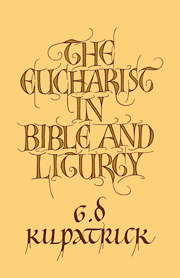Lecture VII
The inheritance of the Eucharist and today: problems of liturgy
Published online by Cambridge University Press: 29 September 2009
Summary
The inheritance of the Eucharist and today: problems of liturgy
At the end of lecture vi we left ourselves with a problem. We had seen the Eucharistic liturgy beginning to take shape in the New Testament itself and had noted the progress of this development in the century subsequent to the New Testament. I had earlier remarked on changes in the understanding of the Euc̀harist in the fourth and fifth centuries and had hinted at other declensions from its older pattern and doctrine. Today we look back over some twelve years of liturgical reform and experiment. How does the product of our efforts compare with the primitive liturgy in its original significance?
Before I answer this question we should consider two preliminary assumptions. First, it is sometimes assumed that what is ancient or Biblical is automatically right. We have only to establish what the Bible says or what the ancient Church did, in order to settle the matter. For example, the liturgiologists seem sometimes to use Hippolytus in this way. The important step appears to be to recover Hippolytus' liturgy as he drafted it early in the third century, and then to re-enact as much of it as our longsuffering congregations will stomach.
Secondly, we sometimes assume that later reconstructions have a kind of divine right. Every so often we hear people talking as though the Sacramentary that Pope Hadrian sent Charlemagne or the Liturgy of Cranmer or the Tridentine Missal were normative. Each has valuable elements, each is instructive, but each has serious defects.
- Type
- Chapter
- Information
- The Eucharist in Bible and Liturgy , pp. 81 - 97Publisher: Cambridge University PressPrint publication year: 1984



